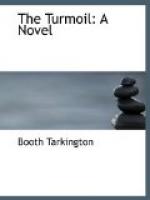was enough to reveal that they were not epistolary.
Sheridan would not have read a “private letter”
that came into his possession in that way, though
in a “matter of business” he might have
felt it his duty to take advantage of an opportunity
afforded in any manner whatsoever. Having satisfied
himself that Bibbs’s scribblings were only a
sample of the kind of writing his son preferred to
the machine-shop, he decided, innocently enough, that
he would be justified in reading them.
It appears that a lady will nod pleasantly upon some windy generalization of a companion, and will wear the most agreeable expression of accepting it as the law, and then—days afterward, when the thing is a mummy to its promulgator—she will inquire out of a clear sky: “Why did you say that the people down-town have nothing in life that a chicken hasn’t? What did you mean?” And she may say it in a manner that makes a sensible reply very difficult —you will be so full of wonder that she remembered so seriously.
Yet, what does the rooster lack? He has food and shelter; he is warm in winter; his wives raise not one fine family for him, but dozens. He has a clear sky over him; he breathes sweet air; he walks in his April orchard under a roof of flowers. He must die, violently perhaps, but quickly. Is Midas’s cancer a better way? The rooster’s wives and children must die. Are those of Midas immortal? His life is shorter than the life of Midas, but Midas’s life is only a sixth as long as that of the Galapagos tortoise.
The worthy money-worker takes his vacation so that he may refresh himself anew for the hard work of getting nothing that the rooster doesn’t get. The office-building has an elevator, the rooster flies up to the bough. Midas has a machine to take him to his work; the rooster finds his worm underfoot. The “business man” feels a pressure sometimes, without knowing why, and sits late at wine after the day’s labor; next morning he curses his head because it interferes with the work—he swears never to relieve that pressure again. The rooster has no pressure and no wine; this difference is in his favor.
The rooster is a dependent; he depends upon the farmer and the weather. Midas is a dependent; he depends upon the farmer and the weather. The rooster thinks only of the moment; Midas provides for to-morrow. What does he provide for to-morrow? Nothing that the rooster will not have without providing.
The rooster and the prosperous worker: they are born, they grub, they love; they grub and love grubbing; they grub and they die. Neither knows beauty; neither knows knowledge. And after all, when Midas dies and the rooster dies, there is one thing Midas has had and rooster has not. Midas has had the excitement of accumulating what he has grubbed, and that has been his life and his love and his god. He cannot take that god with him when he dies. I wonder if the worthy gods are those we can take with us.
Midas must teach all to be as Midas; the
young must be raised in
his religion—




